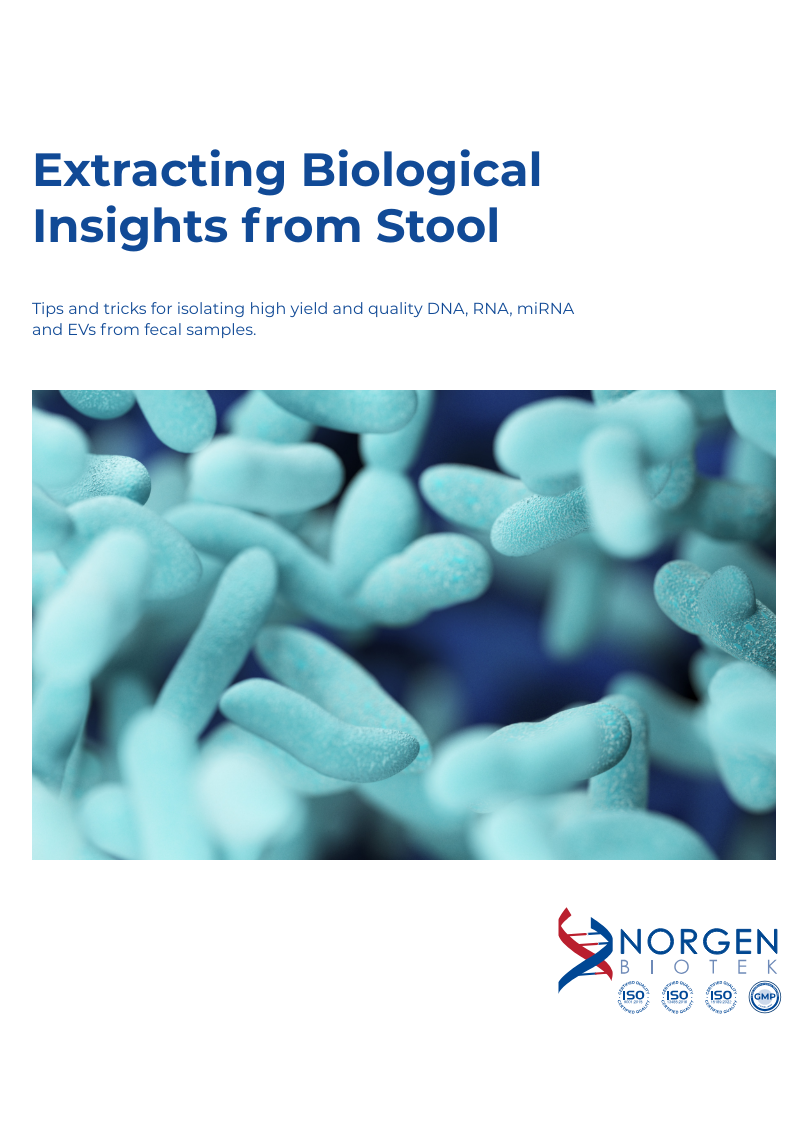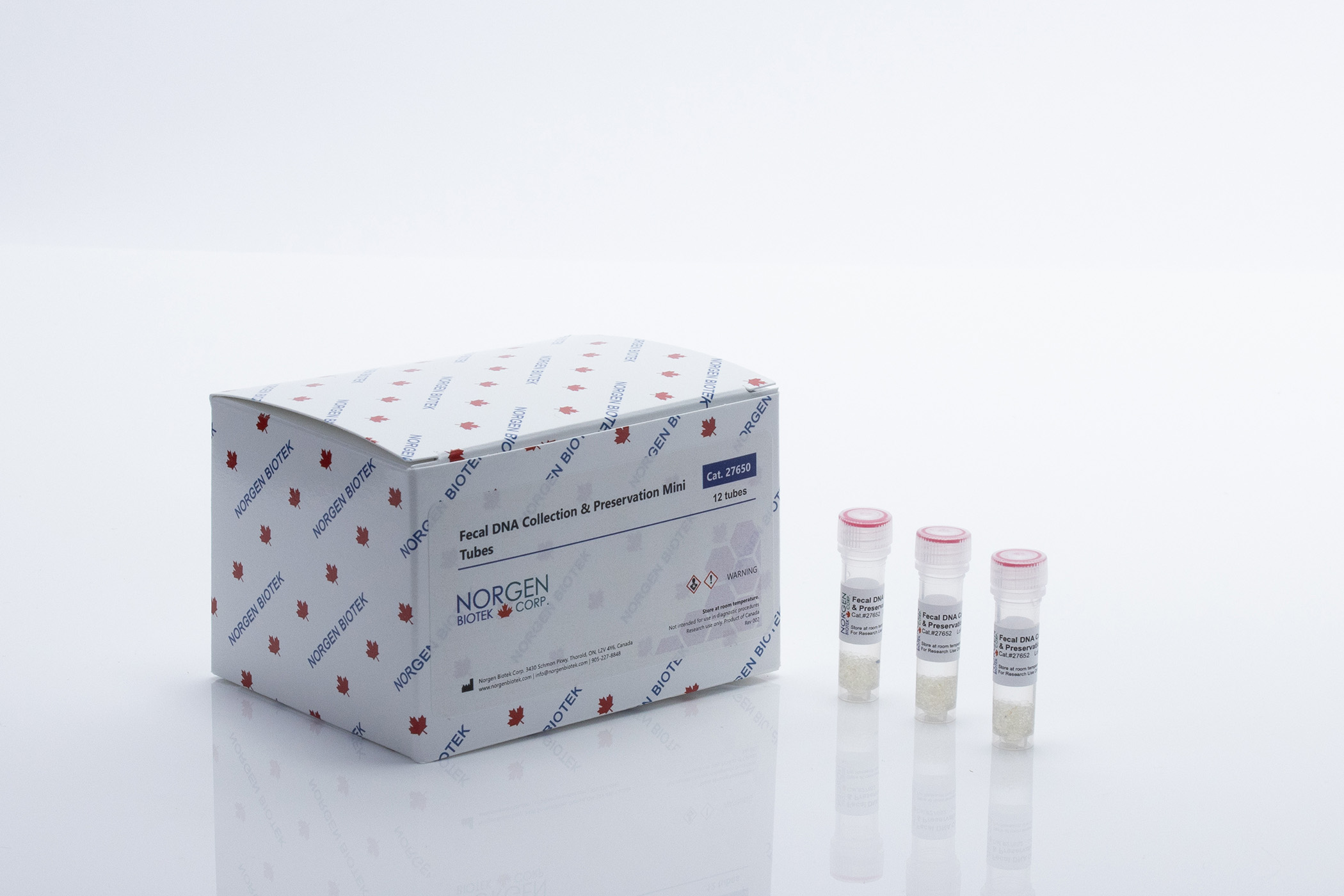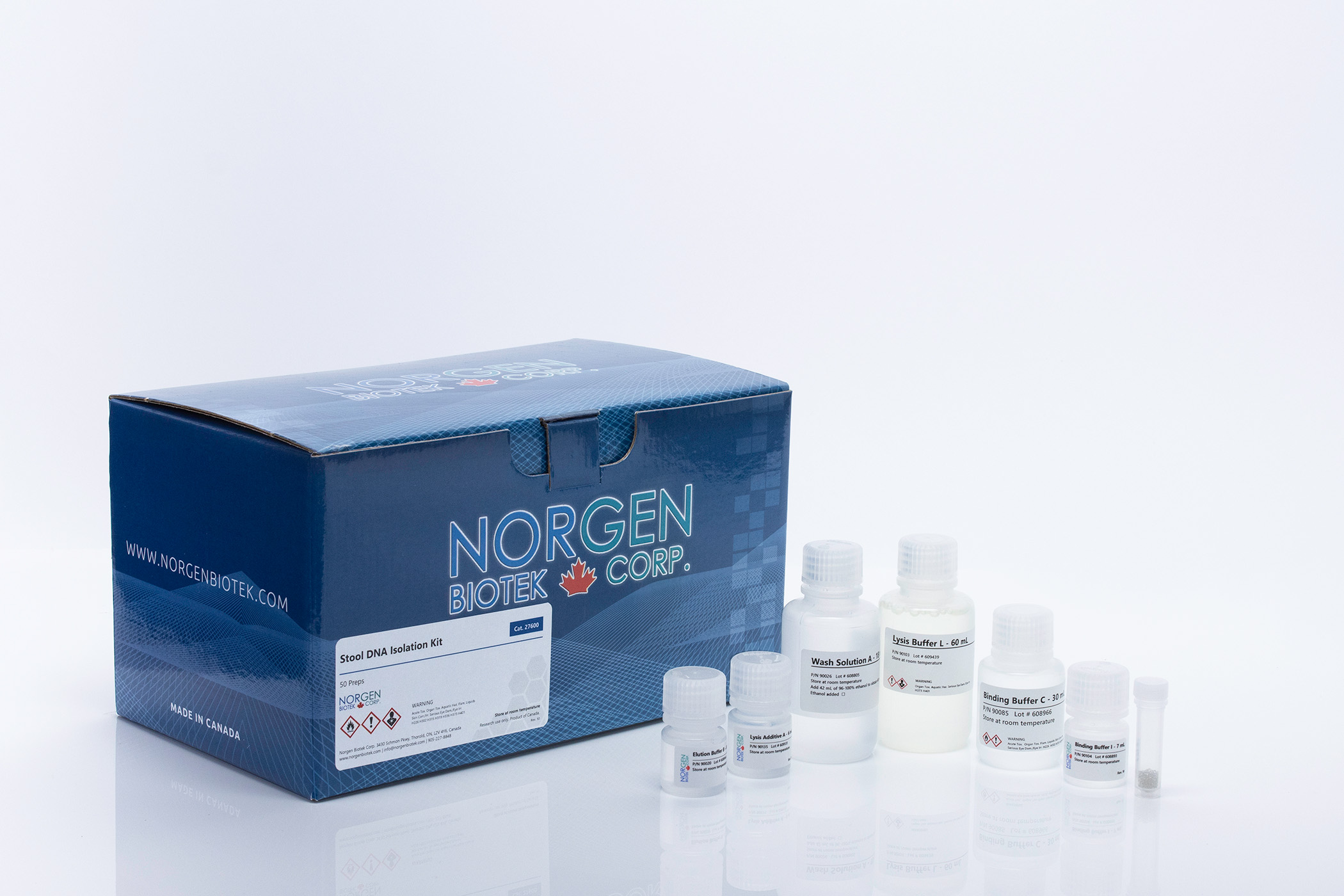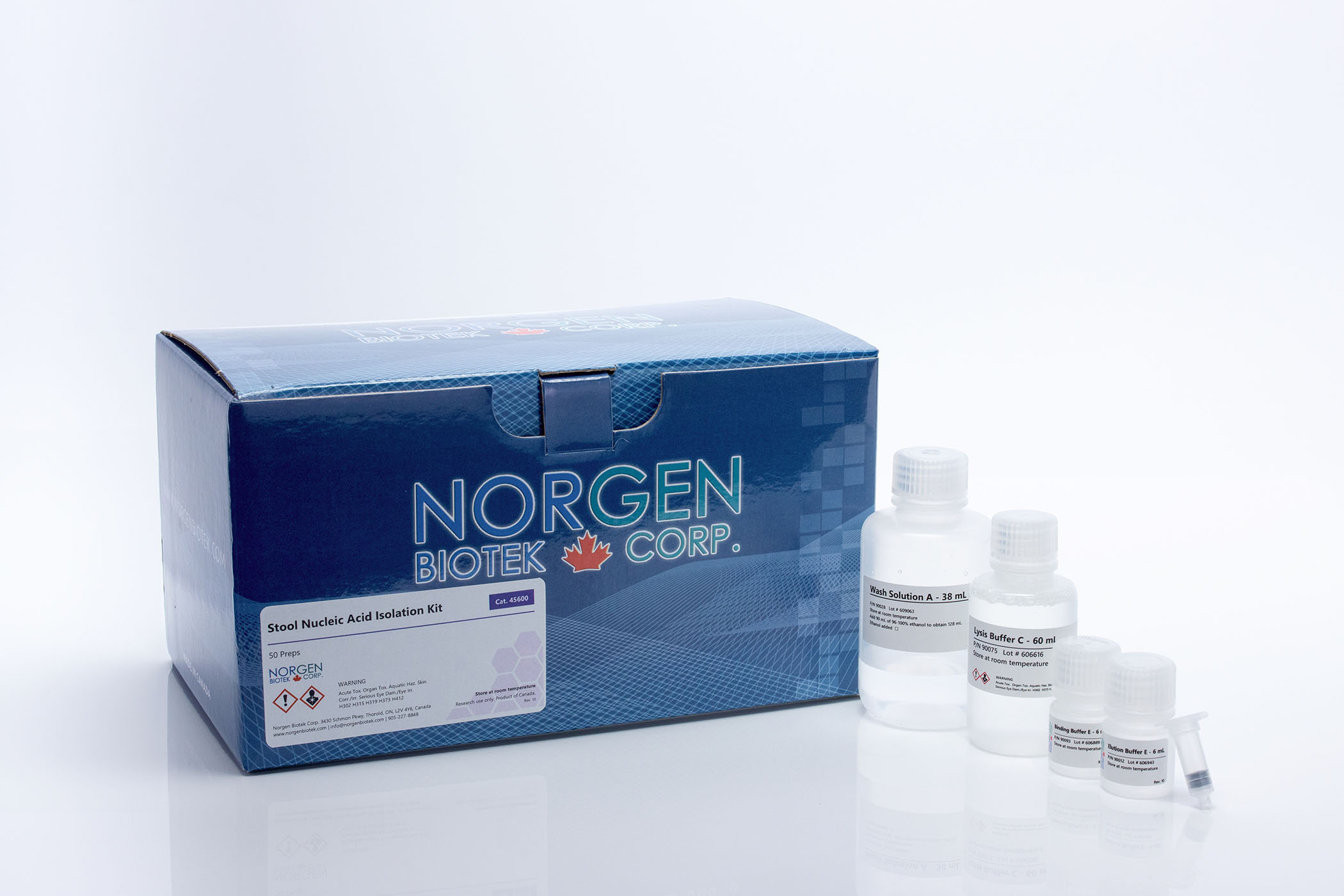Stool Total RNA Purification Kit
A convenient and rapid method to purify total RNA from small amounts of stool samples.


Stool Total RNA Purification Kit
A convenient and rapid method to purify total RNA from small amounts of stool samples.
Register today to receive an exclusive 15% off* on your first order.
Features and Benefits
- Simultaneous isolation of both host RNA and microbial RNA (universal protocol)
- Isolate full diversity of RNA from large RNA down to small and microRNAs
- Eliminates PCR inhibitors including humic acids
- High quality RNA for sensitive downstream application
- Purification is based on spin column chromatography that uses Norgen’s proprietary resin separation matrix
This kit provides a convenient and rapid method to purify total RNA from small amounts of stool samples. All types of stool samples can be processed with this kit, including animal fecal samples, manure and samples collected using Norgen's Stool Nucleic Acid Collection and Preservation Tubes (Cat. 45660). The kit removes all traces of humic acids using rapid and simple spin column procedures. Bead tubes are also provided for effective homogenization of stool. The kit purifies all sizes of RNA, from large mRNA and ribosomal RNA down to microRNA and small interfering RNA. Both host and microbial RNA is recovered. The protocol does not rely on the use of phenol or chloroform, thereby providing a user friendly procedure and allowing high-throughput analysis. The purified RNA is of the highest integrity, and can be used in a number of downstream applications including real time PCR and reverse transcription PCR for gene expression analysis. The procedure can be completed in approximately 30 minutes for 10 samples.

Free Download
Extracting Biological Insights from Stool
Tips and tricks for isolating high yield and quality DNA, RNA, miRNA and EV's from fecal samples
Download for FreeDetails
Supporting Data
Figure 1. High yields of stool total RNA were purified from 200 mg of human stool using Norgen's Stool RNA Purification Kit and a leading competitor's kit, in triplicate. For analysis, 7.5 µL of each 75 µL elution was loaded on a 1.2 % 1x MOPS formaldehyde-agarose gel. Norgen's kit was found to have a higher yield of RNA, isolated from 200 mg of human infant stool.
Figure 2. Yield and Quality of Purified Stool RNA. Total RNA was isolated from 200 mg of human stool using Norgen's Stool RNA Purification Kit and a leading competitor kit. Comparisons were then made based on yield, and A260:A280/A260:A230 ratios measured using the NanoVue Plus™. In Panel A it can be seen that both kits isolated RNA with high A260:A280 ratios (all samples were found to be above 1.8 and below 2.2). In Panel B, Norgen's kit was found to isolate RNA with a high A260:A230 (with all samples once again falling in the 1.8-2.2 range). The competitor kit, however, was found to isolate RNA with extremely low A260:A230 ratios, with none of the samples displaying a A260:A230 ratio higher than 0.20. The results in Panel C are in agreement with the gel photo from Figure 1, and Norgen's kit was found to isolate higher amounts of RNA, with an average yield of 14.58 µg, compared to the competitor’s average of 12.26 µg.
Figure 3. Detection of Bacterial Stool RNA using 16S Primers. Total stool RNA was isolated from 200 mg human stool samples using Norgen's Stool RNA Purification Kit and a leading competitor’s kit. Five microliters of purified RNA was used in a 20 µL reverse-transcription reaction using Invitrogen's Superscript III system with 16S reverse primers. The cDNA generated was then used in a qPCR reaction involving Norgen's 2X PCR Mastermix spiked with SYBR green (Bio-Rad), using 0.3µM of primers against bacterial 16S. As can be seen in the amplification plot, Norgen's kit outperformed the leading competitor's kit by on average 1.5 Ct values. This indicates that Norgen isolated higher quality and yields of RNA from stool, that can be used in an array of downstream applications.
|
Kit Specifications
|
|
|
Maximum Stool Input
|
200 mg (fresh/frozen stool) or 400 μL (preserved stool)
|
|
Type of Stool Processed
|
Preserved, fresh, and frozen stool from humans and animals
|
|
Maximum Column Binding Capacity
|
50 μg
|
| Maximum Column Loading Volume |
600 μL
|
| Time to Complete 10 Purifications |
30 minutes
|
Storage Conditions and Product Stability
All solutions should be kept tightly sealed and stored at room temperature. This kit is stable for 2 years after the date of shipment.
Component | Cat. 49500 (50 preps) |
|---|---|
Lysis Buffer C | 60 mL |
Wash Solution A | 38 mL |
Elution Buffer E | 6 mL |
Bead Tubes | 50 |
Spin Columns | 50 |
Collection Tubes | 50 |
Elution Tubes (1.7 mL) | 50 |
Product Insert | 1 |
Documentation
Videos
FAQs Unpacked: Stool Total RNA Purification Kit (Cat. 49500)
FAQs
Spin Column
Poor RNA recovery could be due to one or more of the following:
- Homogenization was incomplete.
Depending on the sample, further vortexing with the flat bed vortex or bead beater equipment may be required. However, it is not recommended to increase the vortex time to longer than 10 minutes at maximum speed. - Column has become clogged.
Do not exceed the recommended input amount of 200 mg of stool. The amount of starting material may need to be decreased if the column shows clogging below the recommended levels. - An alternative Elution Buffer was used.
It is recommended that the Elution Buffer E supplied with this kit be used for maximum RNA recovery. - Ethanol was not added to the lysate.
Ensure that the appropriate amount of ethanol is added to the lysate before binding to the column. - Ethanol was not added to the Wash Solution A.
Ensure that 90 mL of 96-100% ethanol is added to the supplied Wash Solution A prior to use.
RNA can be degraded due to following factors:
- RNase contamination.
RNases may be introduced during the use of the kit. Ensure proper procedures are followed when working with RNA. Please refer to “Working with RNA” at the beginning of the product protocol documentation. - Improper storage of the purified RNA.
For short term storage RNA samples may be stored at –20°C for a few days. It is recommended that samples be stored at –70°C for longer term storage. - DNase used may not be RNAse-free.
Ensure that the DNase being used for the optional On Column DNA Removal step is RNase-free, in order to prevent possible problems with RNA degradation.
If the RNA does not perform well in downstream applications, It may be due to one or more of the following:
- RNA was not washed with Binding Buffer B and Wash solution A.
Traces of humic acids and salt from the binding step may remain in the sample if the column is not washed with Binding Buffer B and 2 times with Wash Solution A. Salt may interfere with downstream applications, and thus must be washed from the column. - Ethanol carryover.
Ensure that the dry spin under the Column Wash procedure is performed, in order to remove traces of ethanol prior to elution. Ethanol is known to interfere with many downstream applications.
Yes, the Stool Total RNA Purification Kit is compatible with samples preserved with Norgen's stool preservative. Please refer to our Application Note here
Yes, our Stool Total RNA Purification kit has been used successfully with bacterial pellets resuspended and stored in RNAlater®. Please contact our technical support team at support@norgenbiotek.com and ask for reference publications.
Citations
| Title | Modulation of faecal miRNAs highlights the preventive effects of a Mediterranean low-inflammatory dietary intervention |
| Citation | Clinical Nutrition 2024. |
| Authors | Oscar Illescas a, 1 , Giulio Ferrero b, c, 1 , Antonino Belfiore d , Barbara Pardini e, f , Sonia Tarallo e, f , Chiara M. Ciniselli g , Sara Noci a , Elena Daveri h , Stefano Signoroni i , Laura Cattaneo d , Andrea Mancini j , Daniele Morelli k , Massimo Milione d , Francesca Cordero b, c , Licia Rivoltini h , Paolo Verderio g , Patrizia Pasanisi l , Marco Vitellaro i , Alessio Naccarati e, f , Manuela Gariboldi a |
| Title | Gluten-free diet affects fecal small non-coding RNA profiles and microbiome composition in celiac disease supporting a host-gut microbiota crosstalk |
| Citation | Gut Microbes 2023. |
| Authors | Antonio Francavilla, Giulio Ferrero, Barbara Pardini, Sonia Tarallo, Laura Zanatto, Gian Paolo Caviglia, Sabina Sieri, Sara Grioni, Giulia Francescato, Francesco Salla, Cristina Guiotto, Lucia Crocella, Marco Astegiano, Mauro Bruno, Pier Luigi Calvo, Paolo Vineis, Davide Giuseppe Ribaldone & Alessio Naccarati |
| Title | Metataxomics reveals Blastocystis subtypes mixed infections in Colombian children |
| Citation | Infection, Genetics and Evolution 2023. |
| Authors | Gisela M. Garcia-Montoya, Ana L. Galvan-Diaz, Juan F. Alzate |
| Title | Profiling small RNAs in CRC screening samples such as the widely used fecal immunochemical test, is it possible? |
| Citation | medrxiv 2023. |
| Authors | Einar Birkeland, Giulio Ferrero, Barbara Pardini, Sinan U. Umu, Sonia Tarallo, Sara Bulfamante, Geir Hoff, Carlo Senore, Trine B Rounge, Alessio Naccarati |
| Title | Feasibility of miRNA Extraction and Amplification From Chicken Caecal Content in Eimeria tenella INFECTION |
| Citation | Journal of Comparative Pathology 2018. |
| Authors | Fernando, S., Blake, D. P., & Williams, J. M. (2018). |
| Title | Multiplex reverse transcription quantitative PCR detection of a single-stranded RNA virus HcRNAV infecting the bloom-forming dinoflagellate Heterocapsa circularisquama |
| Citation | Limnology and Oceanography 2016. |
| Authors | N Nakayama, M Hamaguchi |
| Title | Modulation of the Intestinal Microbiota Is Associated with Lower Plasma Cholesterol and Weight Gain in Hamsters Fed Chardonnay Grape Seed Flour |
| Citation | Journal of Agriculatural and Food Chemistry 2015. |
| Authors | H Kim, DH Kim, K Seo, JW Chon, SY Nah, GE Bartley, T Arvik, R Lipson, W Yokoyama |




